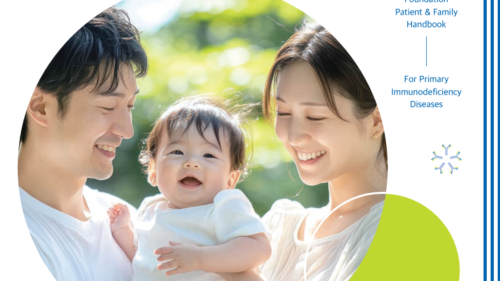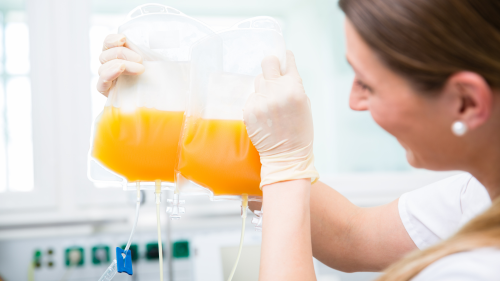
-
Understanding primary immunodeficiency (PI)

Understanding PI
The more you understand about primary immunodeficiency (PI), the better you can live with the disease or support others in your life with PI. Learn more about PI, including the various diagnoses and treatment options.
-
Living with PI
-
Addressing mental health
-
Explaining your diagnosis
- General care
- Get support
- For parents and guardians
-
Managing workplace issues
- Navigating insurance
-
Traveling safely

Living with PI
Living with primary immunodeficiency (PI) can be challenging, but you’re not alone—many people with PI lead full and active lives. With the right support and resources, you can, too.
-
Addressing mental health
-
Get involved

Get involved
Be a hero for those with PI. Change lives by promoting primary immunodeficiency (PI) awareness and taking action in your community through advocacy, donating, volunteering, or fundraising.
-
Advancing research and clinical care
-
Grants
-
IDF surveys
-
Participating in clinical trials
-
Diagnosing PI
-
Consulting immunologist
-
Clinician education

Advancing research and clinical care
Whether you’re a clinician, researcher, or an individual with primary immunodeficiency (PI), IDF has resources to help you advance the field. Get details on surveys, grants, and clinical trials.
-
Grants
An allergist/immunologist at Penn State Milton S. Hershey Medical Center, Dr. Maria Paula Henao sees patients who sometimes drive three hours one way for health services. She treats them for allergies, asthma, and immunology issues, including primary immunodeficiencies (PI). Some of her patients speak only Spanish, and others are Bhutanese refugees. Her specialty clinic is one of only a few in central Pennsylvania that accepts Medicare and Medicaid.
“The patient population is diverse both from a variety of clinical illnesses standpoint and certainly from a patient population standpoint, with very different backgrounds, very different locations—urban, rural, suburban—and diverse from a socio-economic standpoint, as well as ethnic, racial, and importantly from a language barrier standpoint,” said Henao, who is bilingual in Spanish and English.
Henao shared her knowledge and expertise as a planner and participant in the Project ECHO (Extension for Community Health Outcomes) clinician education series on understanding PI that ran from March to July 2023. Presented by Project ECHO at Penn State College of Medicine and the Immune Deficiency Foundation (IDF), and sponsored by a grant from Pfizer, the virtual series consisted of ten sessions to help providers recognize the signs of PI and take appropriate and timely steps to diagnosis. The program also provided an overview of up-to-date, evidence-based treatment recommendations and guidelines.
A companion community navigator series of six virtual sessions that ran from October to December 2023 was designed for community health workers, school nurses, and others serving the larger PI community. The later series focused on navigating PI and provided an overview of evidence-based recommendations, resources, and guidelines for patients with PI.
While the live learning sessions for both series have concluded, videos of the presentations and discussions remain freely available online.
“This is a fascinating series that allows people to gain a further understanding of primary immunodeficiencies. It gets to the nitty gritty of providing a good solid foundation from experts in the field to people within all ranges of the healthcare profession who are taking care of patients with immunodeficiency,” said Henao. “The community health series in particular is helping people in the community get a better understanding of resource availability, and what they can do about this condition. There isn't that much knowledge out there, not because the knowledge doesn't exist, but because these are rare conditions.”
What makes Project ECHO unique is the format of the series. Rather than covering topics in a lecture format, where participants sit passively and listen, Project ECHO sessions consist of a 15-minute presentation followed by a case study discussion. Participants submitted the case studies based on patients they’ve treated, or in the case of the community health series, real-life challenges they’ve had to face. Group participants ask and answer questions, allowing them to both learn from each other and teach each other as they share what they’ve encountered in their practices and lives.
“ECHO does an amazing job of connecting patients and the audience with education, and in that way, does a unique thing where a very small amount of time is spent directly teaching and a big part of the time dedicated is devoted to truly learning in an all-teach, all-learn process,” said Henao.
“For immunodeficiencies, because they are very complicated conditions and they're hard to talk about and we have so many questions about it, the ECHO model works so much better than just a pure lecture because a lot of people who are absorbing that material have a lot of questions and want to engage in practical things, and that's what the ECHO series does—it allows you to get to the next level in terms of being able to gain a practical understanding of primary immunodeficiencies for everybody who participates in the series.”
For the clinician series, almost 80 providers from the U.S. and countries such as India, Canada, Spain, Romania, Poland, and Pakistan gathered regularly for the live online sessions. The community navigator PI series drew 84 participants, including several from outside the U.S.
“We know from medical education in general that the best way to learn is to teach. We have the participants themselves teaching other participants elements they've already been learning in the series and honing those skills. So, it's pretty wonderful to see that,” said Henao, who benefitted from the content and the connections made through Project ECHO.
“Some of the more expert panelists in the series, for instance, in immunology and autoimmunity, became lifelines for me in terms of what I do in certain situations that are very confusing even for myself as an immunologist. Because even if you're an expert in the field, the learning and the education and the expansion never ends.”
Ken Bass, diagnosed with common variable immunodeficiency (CVID) in 2006, served as a patient voice in both the clinician and community health series. The exchange between clinicians proved valuable, he said, particularly for the instruction on the basics of PI. For example, a few doctors in the group didn’t know what kind of lab work to order if a PI was suspected.
“That reaffirmed what we always hear in the PI circle, which is that you are your best advocate and that professionals don't always understand. They don't know what questions to ask, what tests are run, what things to check, and so you should make sure that you do,” said Bass.
Bass, who receives intravenous immunoglobulin (IVIG) replacement therapy, is a Plasma Ambassador who visits plasma centers and explains to donors how important their donations are to his health and many others who rely on plasma for treatment. Bass felt honored to participate in both series of Project ECHO and to tell others about his PI journey.
“I like sharing my story and helping people understand more about PI,” said Bass.
Amanda Terkanain, a single mother of three kids who is diagnosed with a PI, said participating in the community series reminded her to “keep pushing harder” and advocate for herself when confronting the challenges of juggling illness, a career, and family obligations. She appreciated how providers and patients spoke “frankly and honestly.”
“When I first got involved, I just sat back and watched a lot but then you start to realize there are no dumb comments, there are no dumb questions. This all-teach, all-learn format isn't just in word only. It is an actionable platform where everybody there really wants to help one another and build this network,” said Terkanain.
Related resources

IDF Patient & Family Handbook for Primary Immunodeficiency Diseases, Sixth Edition (Korean)

Manual para pacientes y familias sobre inmunodeficiencias primarias, sexta edición

COVID convalescent plasma approved for those who are immunocompromised
Sign up for updates from IDF
Receive news and helpful resources to your cell phone or inbox. You can change or cancel your subscription at any time.





The Immune Deficiency Foundation improves the diagnosis, treatment, and quality of life for every person affected by primary immunodeficiency.
We foster a community that is connected, engaged, and empowered through advocacy, education, and research.
Combined Charity Campaign | CFC# 66309

